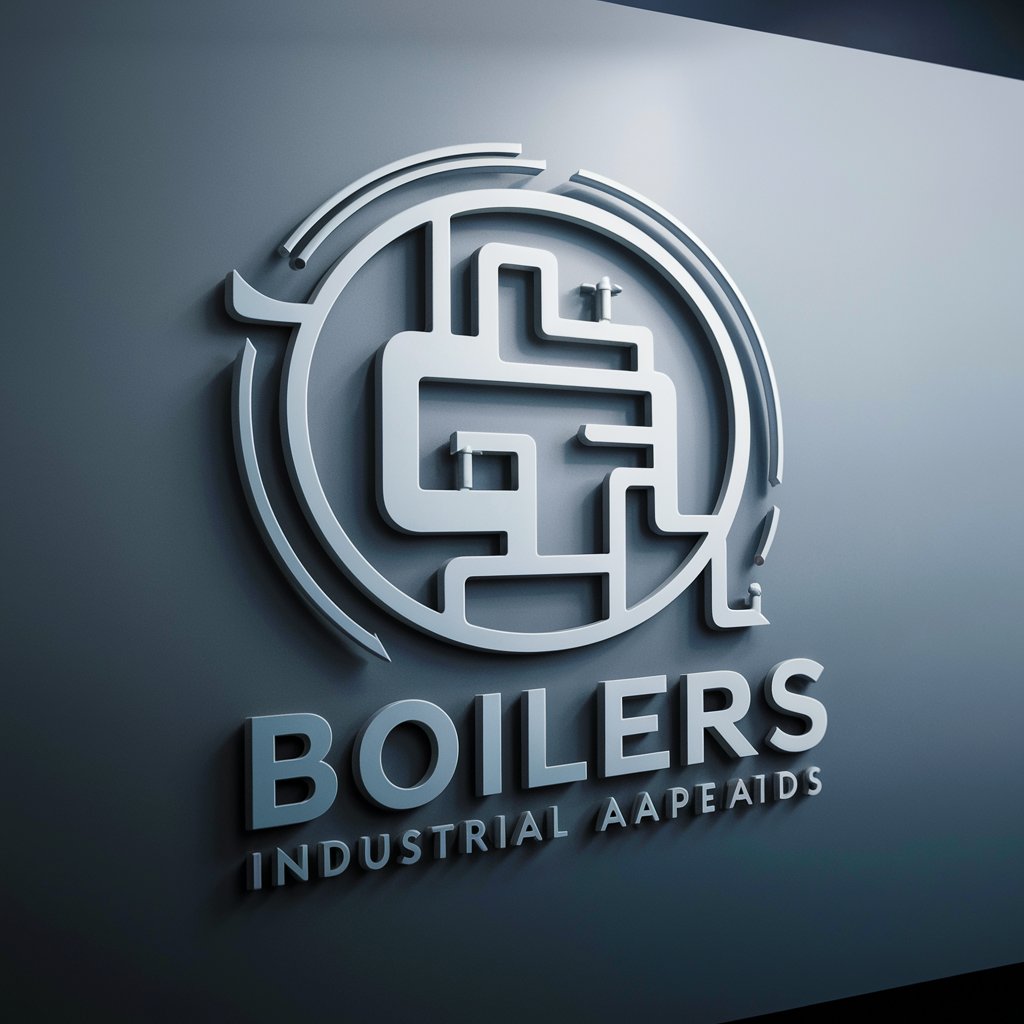Boilers - Boiler Usage Insights

Welcome! Let's dive into the world of industrial boilers.
Powering Industries with AI-Enhanced Heat
Can you explain the differences between fire-tube and water-tube boilers?
What are the common maintenance practices for industrial boilers?
How are boilers used in the chemical manufacturing industry?
What are the advantages of using condensing boilers in industrial settings?
Get Embed Code
Introduction to Boilers
Boilers are specialized pressure vessels designed to generate steam or heat water. They operate by transferring energy from a fuel source (like natural gas, oil, or coal) into water, heating it until it becomes steam or hot water. The steam or hot water is then used for various applications such as heating, power generation, or industrial processes. The design and operation of boilers are crucial for efficiency and safety, incorporating features like heat exchangers, burners, control systems, and safety valves. Examples of boilers include fire-tube boilers, where the fire passing through the tubes heats water around them, and water-tube boilers, where water passes through tubes that are heated by the surrounding hot gases. Powered by ChatGPT-4o。

Main Functions of Boilers
Steam Generation
Example
Power Plants
Scenario
In power plants, boilers are used to generate steam that drives turbines connected to electricity generators. The steam's pressure and temperature are raised in the boiler, then it is expanded in a turbine, converting thermal energy into mechanical and subsequently electrical energy.
Heating Applications
Example
Commercial Buildings
Scenario
Boilers provide hot water or steam for heating buildings through radiators or underfloor heating systems. In commercial buildings, such as offices or hospitals, boilers ensure a comfortable indoor environment during cold seasons.
Industrial Processes
Example
Food and Beverage Industry
Scenario
In the food and beverage industry, boilers supply steam for various processes, such as cooking, drying, and pasteurization. Steam's ability to transfer heat efficiently and uniformly is critical for maintaining the quality and safety of food products.
Ideal Users of Boilers Services
Industrial Sector
Businesses that rely on steam or hot water for their manufacturing processes, such as chemical plants, refineries, and food processing facilities. Boilers are essential for these operations, providing the necessary heat or steam for processing materials and products.
Energy and Power Generation
Utilities and companies in the energy sector that generate electricity. Boilers are used in power plants to produce high-pressure steam for generating electricity, making them critical components in the power generation infrastructure.
Commercial and Residential Buildings
Property managers and owners of commercial and residential buildings use boilers for heating and hot water supply. They benefit from boilers' efficiency and the ability to provide a comfortable living or working environment.

Effective Boiler Usage Guidelines
1
Start by exploring YesChat.ai for a no-login, free trial experience, including access to advanced features without the need for ChatGPT Plus.
2
Determine the specific application of the boiler within your industry, whether it's for heating, power generation, or process steam production, to ensure you select the appropriate type and capacity.
3
Perform a detailed analysis of your steam or heating requirements, considering factors like peak demand, efficiency, and fuel type, to optimize the boiler's performance and cost-effectiveness.
4
Follow the manufacturer’s installation guidelines closely to ensure safe and proper boiler installation. This includes considerations for location, venting, water supply, and fuel supply.
5
Implement a regular maintenance schedule, including inspections, cleaning, and repairs, to prolong the boiler's lifespan and maintain efficiency, focusing on components like burners, heat exchangers, and controls.
Try other advanced and practical GPTs
Best Selling
Empower your shopping with AI insights.

Pitch Deck Pro
Enhance Your Pitch with AI-Powered Insights

Sébastien Belle : Consultant en Ligne
Empowering Digital Transformation with AI

Strategic Tweet GPT
Craft tweets with AI-powered precision.

맛집 Master
Discover the Best Eats, Powered by AI

Workshop Designer
Empower Your Workshops with AI

Net Present Value (NPV)
Empowering Investment Decisions with AI

" Personal Lawyer"
Empowering Legal Decisions with AI

eCommerce Fulfilment James and James GPT
Empower Your Ecommerce with AI-Powered Fulfilment Insights

Fluffy Chaos Friends
Bringing fantastical creatures to life with AI.

SamenStromen Blogs
Empowering Energy Futures with AI

Offer Analyst
Enhance Your Offers with AI-Powered Insights

In-depth Q&A on Boilers
What are the main types of industrial boilers?
Industrial boilers are primarily categorized into fire-tube, water-tube, electric, and condensing types. Fire-tube boilers are suitable for lower pressure applications, whereas water-tube boilers are designed for high-pressure and high-capacity needs. Electric boilers offer clean, efficient heating with no emissions, and condensing boilers are highly efficient, utilizing waste heat to preheat incoming water.
How does boiler efficiency impact operational costs?
Boiler efficiency directly affects fuel consumption and operational costs. Higher efficiency boilers convert a greater portion of their fuel into usable heat, reducing fuel requirements and lowering energy bills. Regular maintenance and the use of high-quality fuel can also improve efficiency and reduce expenses.
Can boilers contribute to renewable energy efforts?
Yes, boilers can be integrated into renewable energy systems. Biomass boilers, for example, use organic materials as fuel, offering a carbon-neutral heating solution. Additionally, boilers can be adapted to use renewable energy sources, such as solar thermal systems, to preheat water, reducing fossil fuel consumption.
What are the safety considerations for boiler operation?
Safety considerations for boiler operation include regular inspections, adherence to operational limits, and the implementation of safety devices such as pressure relief valves, low-water cutoffs, and flame safeguard systems. Proper training for operators is also crucial to prevent accidents and ensure safe operation.
How can one optimize boiler performance over time?
Optimizing boiler performance involves regular maintenance, including cleaning, adjusting combustion, monitoring water quality, and replacing worn components. Implementing energy efficiency measures, such as insulating pipes and using economizers, can also enhance performance and reduce operational costs.
